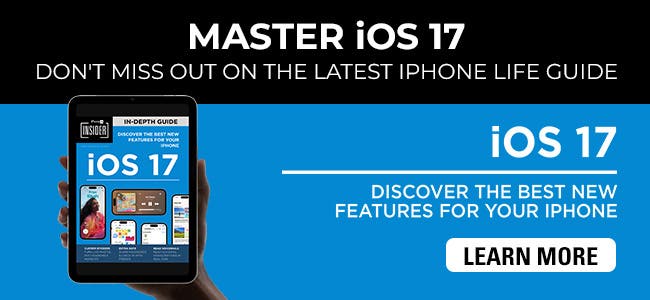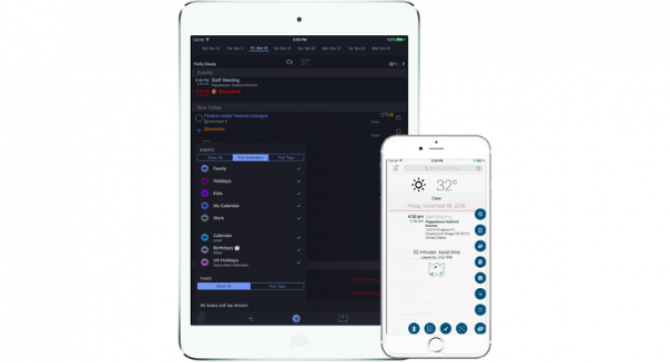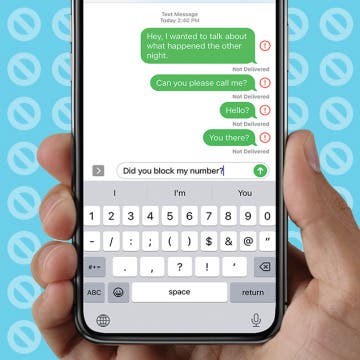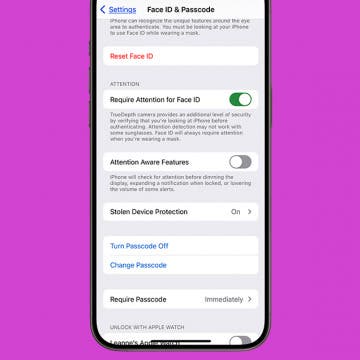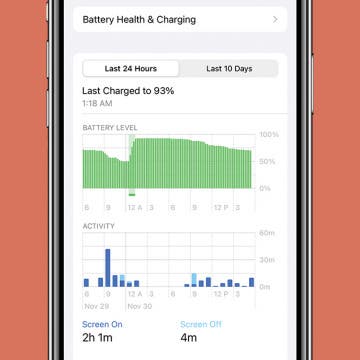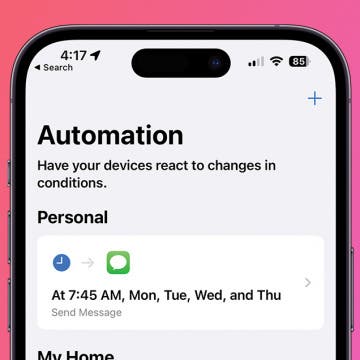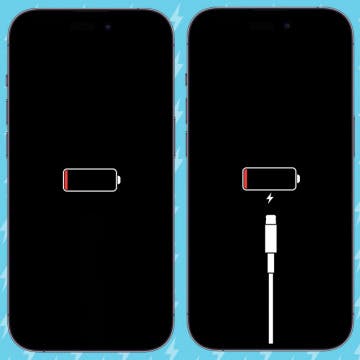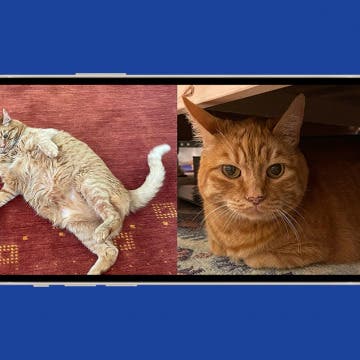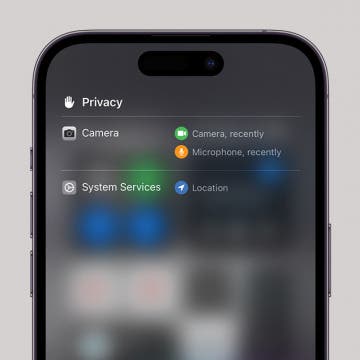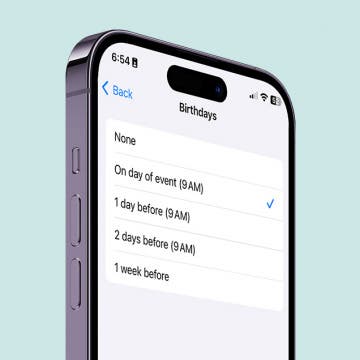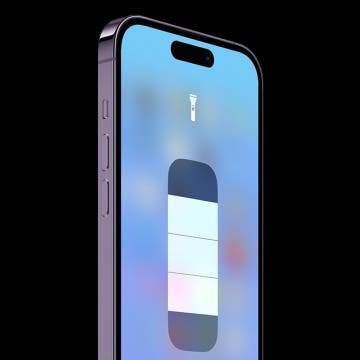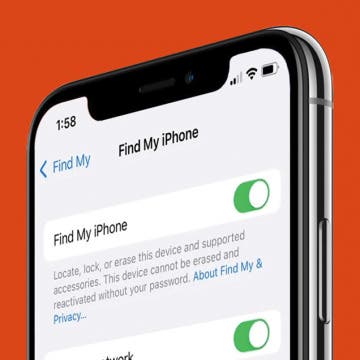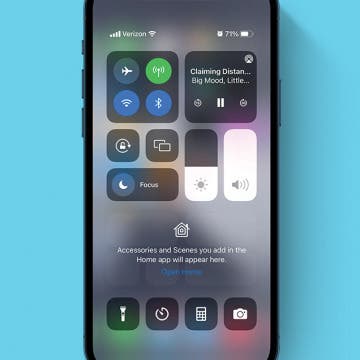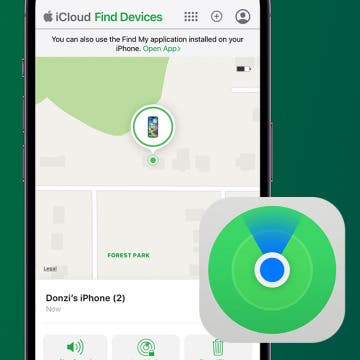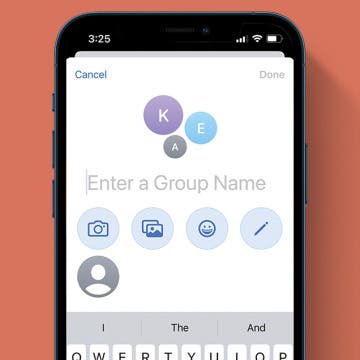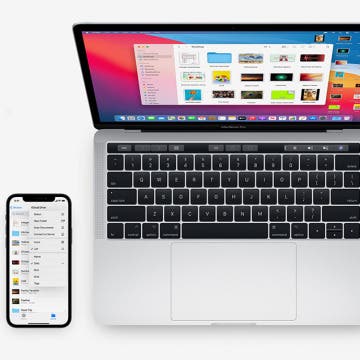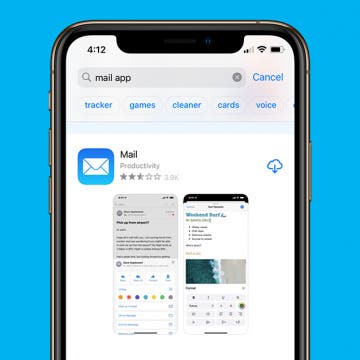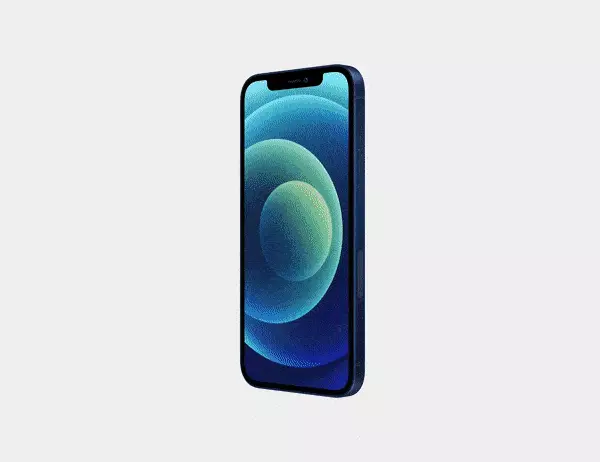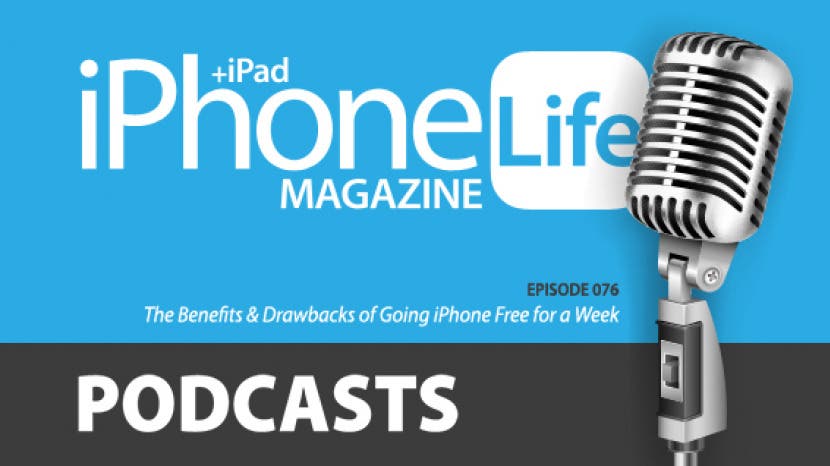
In the 76th episode of the iPhone Life Podcast, find out why members of the iPhone Life team chose to participate in (or opt out of) of a company-wide "phone fast." Listen in to hear lessons learned and how they survived to tell the tale! Other topics include Animoji, sleep apps for combating insomnia, and Jabra's lineup of true wireless earbuds.
Click here to listen and subscribe. If you like what you hear, be sure to leave a review. And remember to tune in every other week to hear our editors share with you the latest Apple news, best apps, iPhone tricks, and coolest accessories.
This episode is brought to you by Scosche, makers of the qi wireless charging MagicMount line. Whether you need a mount and charger for your vehicle, home/office, or both, Scosche has you covered with three different MagicMount Charge models, each designed to work seamlessly with the iPhone 8, iPhone 8 Plus, and the iPhone X.

This episode was recorded using high-quality mics from Blue Microphones.
Question of the week:
Do you have negative habits with your phone that you could live without, and if so, what are they? And if anybody is inspired to do a phone fast for a week, also let us know how that goes! Email podcasts@iphonelife.com to let us know.
Articles referred to in this episode:
- How to Save Your Safari Reading List for Offline Viewing with iOS 11
- Can't Sleep? The Sleep Genius App Is Here to Help
Gear referred to in this episode:
- Jabra Elite 65t true wireless earbuds ($169.99)
- Jabra Elite Active 65t true wireless earbuds ($189.99)
- Jabra Elite Sport true wireless earbuds ($219.99)
Useful links:
- Become an iPhone Life Insider
- Sign up for the free Tip of the Day Newsletter
- Email the Podcast
- Subscribe to iPhone Life magazine
Transcript of episode 76:
David Averbach: Hello and welcome to iPhone Life Podcast. I'm David Averbach, CEO and publisher of iPhone Life Magazine.
Sarah Kingsbury: I'm Sarah Kingsbury, senior web editor of iPhone Life Magazine.
Leanne Hays: I'm Leanne Hayes, web writer for iphonelife.com.
David Averbach: And we've got a great show for you today. Before we get into it though, I want to tell you a little bit about our sponsor, Scosche. So Scosche has this great line, what they call "Magic Mount." How it works is it has a little magnetic piece that either fits on the back of your phone, in between the phone and the case, or they actually have a case now that has a tube, and when you put that on what you can do is you can magnetically stick your phone to their mount. They have a line of mounts for the home, for the office, for the car. Not only will it position the phone at the perfect angle for life or home office, car, but also it'll charge while you do it. So now with wireless charging, you'll be charging your phone, have it positioned in the correct angle, wherever you are.
Leanne Hays: I yearn for one.
David Averbach: They are actually a CES award winner. So make sure you check them out. You can go to scosche.com, or if Scosche sounds like a really hard word to spell, go to iphonelife.com/podcast and we'll link to it.
Sarah Kingsbury: Yep.
David Averbach: All right, so we have Leanne here today, and Leanne, this is her first podcast. She's the newest member of the iPhone Life team. Welcome, Leanne.
Leanne Hays: Thank you.
David Averbach: So later on in the podcast [inaudible 00:01:33], Leanne did a phone cleanse. So this is something Leanne and Ran, who isn't here right now, did this together. Basically they didn't use their phone for an entire week. Is that it?
Leanne Hays: That is correct.
David Averbach: So that is coming up. But first, let's tell you about iPhone Life tip of the day. So if you aren't subscribed, make sure you check it out. It's free and every day we send you an e-mail telling you how you can use your phone to be more productive. We'll tell you tips and tricks to be more productive with your phone, iphonelife.com/dailytip. Sarah, what was your favorite tip from this week?
Sarah Kingsbury: It wasn't from this week.
David Averbach: What was your favorite tip in life?
Sarah Kingsbury: I really like this tip, which is how to save your Safari reading list for offline viewing. Because I don't know about you, but I constantly come across articles I want to read, but also I'm only just quickly scrolling through my phone and I have five minutes. So you can save these articles to your reading list by tapping the share icon, which is the little rectangle at the bottom of your screen with a little arrow, and choosing "save to reading list," which is a little symbol of eyeglasses. But if you want to be able to read them offline later, cuz not everyone has unlimited data and we're not always in places with good service ...
Leanne Hays: In Iowa.
Sarah Kingsbury: And lots of places. You can go to settings and tap Safari, and then near the bottom under "reading list" you can toggle on "automatically save offline." And then no matter what, you can go back and read those articles when you have time.
David Averbach: Very cool.
Sarah Kingsbury: Or they can just sit there forever and you can delete them once they're not relevant anymore.
David Averbach: Yeah, I always run into this. Once a year I get inspired to use these reading list things and I'll add a bunch of articles, and then somehow I never make the time to read them and they sit there forever.
Sarah Kingsbury: That is the trick. I have started just checking out my reading list regularly, which is why I like this tip. Because if you do it regularly, it's amazing. You actually keep up with the things you want to read.
David Averbach: Bonus tip for you.
Sarah Kingsbury: Life tip.
David Averbach: All right. Next up we have iPhone Life Insider. iPhone Life Insider is our premium subscription. With it you get a video tip every day. You get in depth guide. We, just this week, came out with an iPhone 10 guide that's amazing. I don't know about you guys, but I have had a hard time kind of figuring out all the cool new things you can do with your iPhone 10. There's a lot of little tricks without the home button, so we walk you through all of it. And in addition, you get a digital subscription to the magazine, and finally, you get to ask Sarah your iPhone-related questions. Sarah, what was an interesting question from this week or from whenever?
Sarah Kingsbury: Well, we heard from an Insider who's going to be, actually, out at sea for nine days. So talk about needing to ...
David Averbach: Offline reading list.
Sarah Kingsbury: Right. But he wants to take advantage of this time, this downtime ... I guess you have a lot of time if you don't have access to the Internet ... to reduce his very large photo library by about half. What he's concerned about is what happens when he gets back to wi-fi. How can he make sure that they don't just reappear. So basically, you just have to be signed into iCloud Photo Library and have that set up. So then when you get back to wi-fi and you back your phone up to the cloud, that will make those changes, and then when you open up your Mac, they'll be gone from there too.
David Averbach: One of the many reasons to have backup set up properly.
Sarah Kingsbury: Yes.
David Averbach: All right, so make sure you check out iPhone Life Insider, iphonelife.com/insider. Let's get into things we learned this week, or complaints. Who wants to go first?
Sarah Kingsbury: I have a complaint.
David Averbach: Okay. I am not surprised.
Sarah Kingsbury: I am the only one who prepared for this podcast.
David Averbach: Hey, no, I have a ... I actually have a learning.
Leanne Hays: I have a learning as well.
Sarah Kingsbury: Well, we'll start with my complaint.
David Averbach: Okay.
Leanne Hayes: Okay.
Sarah Kingsbury: So I use a lot of different health tracking apps, and it's great, because they all integrate with Apple's health app and share information. So if I use my Apple watch, it's in the Activity app, and it coordinates with the Health app, and I also use MyFitnessPal, among other apps, so then it gets that information as well. But one thing is, I would like some calendar integration. I have an app that tracks some health things, and they happen regularly, and I would like to be able to see those things in my actual calendar, but there's no integration.
David Averbach: There's no apps that integrate health, fitness stuff with a calendar?
Sarah Kingsbury: But I think you need to know. If you exercise on regular days or if you're menstruating on certain days, that can actually make a difference in what you're gonna schedule on those days.
David Averbach: Mm-hmm (affirmative), totally.
Sarah Kingsbury: So I want to be able to see that stuff, not have to switch back and forth between apps in order to add things to my calendar. It's happened many times that I've made an appointment and then realized, "This is the worst time to make that appointment."
David Averbach: That makes sense. That sounds like a third party app complaint though, right?
Sarah Kingsbury: I mean, the Mail app, it is integrated like when events are scheduled come to me in an e-mail, it will suggest in my calendar app that i add them. I want to know why, if certain health things are happening on certain days in a certain app, why it can't be suggested in my calendar app? So I want some sort of calendar kit that developers can use to integrate the information from their app into Apple's calendar app.
David Averbach: Gotcha, gotcha. That makes sense. I can go next, because I prepare for podcasts. It's a thing I do. I don't know if you know this.
Sarah Kingsbury: I do know that, and I'm glad to hear it.
David Averbach: Yeah. I was in Mexico recently, and I took this really cool panoramic shot, and I went to Facebook and I went to upload the photo, and I discovered that Facebook has a really cool new feature where it will automatically name panorama shots and it will turn them into a 3D video. So kind of the equivalent of what Facebook does, it's kind of a little bit AR where you can turn your phone and it'll pan the whole panorama, but it'll only show you one little bit of it at a time. And it was really cool and I want to do it more often, so that was a cool discovery. You're like, "I knew that."
Sarah Kingsbury: Yeah, but it is cool, and you also don't have to turn your phone because you can sometimes accidentally find yourself turning in circles. You can actually swipe back and forth along the panorama.
David Averbach: Yeah, that's true too, that's true too. I knew that Facebook had that feature, I didn't know that it would automatically turn photos that I took with panorama into that.
Sarah Kingsbury: Yeah, that is cool. I didn't know that.
David Averbach: Oh, okay, good. See? Real discoveries happening here. Leanne?
Leanne Hays: I started using animojis this week.
David Averbach: Are you obsessed now?
Leanne Hays: Kind of. I'm trying not to overplay my hand with the animojis, but I just laugh every single time I use them. So I think that in and of itself is extremely valuable. Instead of sending my roommate a text saying, "Should I pick up eggs?" I can send my roommate a text of a chicken asking if it should pick up eggs.
David Averbach: Really important use cases here, people. Take notes.
Leanne Hays: Well, but I think that just feeling good and humor, if you can get that much out of a laugh out of such a small feature, that's great.
Sarah Kingsbury: They're sort of out of proportion in terms of how enjoyable they are, aren't they? Like I did not expect that. I thought they were really stupid.
Leanne Hays: No, at first I thought it was kind of frivolous, but then once I started using them I thought, "The only thing here that could be wrong is if I overuse this."
Sarah Kingsbury: Is it possible to overuse them?
David Averbach: No, it's not.
Leanne Hays: People might get bored of the chicken. I have to mix up.
David Averbach: Yeah, you gotta mix it up. You gotta mix it up.
Leanne Hays: Other than that, I don't think it could be overused at all.
David Averbach: All right, I have a bonus question for you Leanne. I'm gonna put you on the spot here. Leanne has taken over for Connor writing many of our tips. Leanne, having been writing the tips now for a while, what is the thing that's kind of surprised you being at iPhone Life, doing the tips, in terms of your phone?
Leanne Hays: I think it's a situation of, I had no idea how much I didn't know. At first I had a hard time finding tips to write and I thought, "They've all been written. There's nothing out there I can write about." And now it seems like, somehow, something has cracked open and there are too many tips to write. There's so much out there and more happening every minute. I guess I just realized I will never know everything about the iPhone, and I'm on a treadmill trying to keep up.
David Averbach: I agree, and I think that's actually one of the most common questions I get when I tell people who I don't know about my job, is, "Don't you run out of tips? Don't you run out of recommendations?" And as those of you who are subscribed to the newsletter know, you never do. There is so much and every year it changes, every month it changes. For example, I think I've read that animojis ... they're coming out with new animojis, right?
Sarah Kingsbury: I don't think they have new ones yet. Leanne would know.
Leanne Hays: I'm gonna look into this right after this podcast, because now I'm just excited, and there should be more animojis. I feel like there should be, at bare minimum, one or two reptiles. The reptiles are under-represented.
David Averbach: Yeah, what's up with that? Okay. So before we move on with apps and gear recommendations, I wanted to take a minute to catch up on all of our e-mail. We got a lot of e-mails from you guys. We got two episodes worth of e-mails to catch up on. So first of all, the battery gate. I'm gonna call it the battery gate, because everything needs a gate these days, which was, if you were listening to the podcast you remember we were talking two episodes ago how Apple came out and admitted that batteries, that they were slowing down old phones in order to save battery. So we talked about it, we were a little bit angry, and we asked you guys what you guys thought, and it turns out you guys are way more angry than we are. I mean, we got a lot of people who are really upset about it. I'm gonna read a couple of them.
First one starts with, "I am angry. I am angry about the battery revelation and the slowing down of the iPhone. I requested a replacement and they told me at the store it would take up to four days to get them. I called after two weeks out of not hearing from them and was told they had many requests, therefore it was going to take longer, maybe a few weeks. Then I got a call saying it would take up to April before they had them. Also, I noticed that they haven't sent out an update for older phones to roll back the slowing down process. All of this is annoying." I agree.
And we got a lot of e-mails to that same point, which is that Apple ... And it makes sense in some ways that Apple wasn't prepared for controversy. They didn't mean to cause a controversy, so they didn't have a backlog of a ton of batteries in inventory. But now they're out of batteries and everybody's angry and wants to switch it, and they have to do a software update, but that takes time. So Apple's in a no-win position, but they're really not wining on this issue. I'm angry on behalf of our reader here, and we had a lot of people with the same complaint.
Sarah Kingsbury: Mm-hmm (affirmative).
David Averbach: All right, number two. "I ordered a new battery for my iPhone 6 Plus a couple weeks ago. I had to wait in line at the Apple store with only one salesperson helping. He first had to run diagnostic tests. Said I needed one, which I knew. It basically only works on the Mophie battery, which is a good indication." And actually that brings up a good point, which is, if you have a battery case, will then your phone work quickly again? Do you guys know this?
Sarah Kingsbury: I do not know.
Leanne Hays: Where's the test?
Sarah Kingsbury: But I do know leaving your phone in a battery case can be damaging to your battery.
David Averbach: Yeah. But it does seem ... I have a feeling it will. Because I know it only works when the battery isn't functioning properly.
Sarah Kingsbury: Right, to prevent shutdown.
David Averbach: So that makes sense. "And then the battery won't come before March because they had discontinued my model." And this person ended with, "Not happy!"
Sarah Kingsbury: Yeah, and we talked about that. Weren't they saying that people with iPhone 6 Pluses might get an upgrade to a new phone? But it doesn't sound like that's necessarily happening.
David Averbach: Yeah. It sounds like if they don't have a battery for you, it sounds like they're just not being very helpful. So Apple definitely needs to be ... I mean, they need to be better handling this situation. I think we can all agree on that.
Leanne Hays: How did they not know people would be upset with this and want to replace their batteries, though? Did no one anticipate this?
David Averbach: I don't know.
Sarah Kingsbury: I mean, they weren't exactly forthcoming. It was a third party who found this out.
David Averbach: Yeah, but they went on and confirmed it, so at that point they probably knew, but at that point it's probably too late. It wasn't like a timed announcement they had, somebody else brought it up and they had to deal with it.
Sarah Kingsbury: And I think if they had denied it or whatever, I think that would've been worse for them.
David Averbach: Yeah, yeah.
Sarah Kingsbury: I think they did only thing they really could do to make it not quite as bad.
David Averbach: I agree. Okay. Moving on to the HomePod. So last episode, we talked about the HomePod. Sarah and I have pre-ordered that HomePod. Leanne, are you getting a HomePod?
Leanne Hays: Not yet. I'm still learning the iPhone 10, so the HomePod will have to be my next evolutionary step.
David Averbach: Okay. So mine comes on February 9th. I'm very excited. We asked you guys what you guys think. We got a great answer here. "Interesting comment on the podcast. I was going to buy the HomePod when it was due out last December. When it was delayed I bought an Amazon Echo Plus. The Echo Plus cost around $170, which is half the price of the HomePod and has built in, quote-unquote, 'Bridge.' The Echo sounds quite good to me and works well with Spotify. I am not an audiophile, but it sounds better than my Logitech Bluetooth speaker. There are, quote-unquote, 'skills' for many devices like Philips hues light, Logitech harmony remote, TV, air conditioning, thermostat switches, locks, et cetera, et cetera. Amazon reportedly has 5,000 staff working on expanding the skill base. Amazon has opened up the ability to add skills to developers, so I suspect Apple will have difficulty catching up. Alexa is great to use and can do a variety of things out of the box, including make phone calls."
Now I struggle to make phone calls with Alexa, and I don't think it works with the iPhone particularly well. I know you can do it, but I don't think it's easy. Sorry, this is me interjecting. "Oder Uber, shopping lists, appointments, and to-do lists. I can't ask it who is playing the trumpet in a particular Spotify track, that would be a lot. But then again, I'm not an audiophile. Alexa is integrated with Wikipedia. Someone can ask her to tell you about particular topics. I agree, voice is the new UI. Much has been said about security. When I am not using Alexa, I turn the microphone off, which is a good practice, and the top goes red. Apparently Amazon only listens to what Alexa and only can do this on the microphone." Do you guys know if that's true? I'd heard they listened the whole time.
Sarah Kingsbury: Yeah, I've heard that it's always on, but I haven't looked into that recently at all.
Leanne Hays: The paranoid side of me is wondering about that. I don't want to be too much of a conspiracy theorist, but.
David Averbach: Yeah. "I have little interest in Apple Music as most of my music is in iTunes. My playlists work well on Apple TV. Spotify is great supplement, and also works with car play. I look forward to your view, but I don't need to spend $349 for a speaker that is behind the competition." Honestly, when I read it, it's like, he really succinctly summed up all my current concerns about HomePod. Like, it's really compelling argument. I will say, I haven't had the best experience with my Amazon Echo Dot. Not that it doesn't work, just that it wasn't particularly easy to set up. Some of the skills, because they're third party skills, don't integrate as well as I want them to, and it just isn't as integrated with my iPhone as I wanted. So I am still excited about the HomePod despite this review, but honestly, I think if you're not just an early adopter who wants to check out home adopter, if you're not really invested in your Apple ecosystem, this is not probably the right platform for you. I think Amazon Echo is definitely ahead. What do you guys think?
Sarah Kingsbury: Yeah, and Google Home.
David Averbach: And Google Home, yeah.
Leanne Hays: It's gonna be up to you two to write the article and compare and contrast.
Sarah Kingsbury: And another thing is, the HomePod can only be used with iPhones and not every household only has iPhones, which I think is a deterrent for people to buy it, because everyone's gonna want to use a smart speaker in their home if there is one.
David Averbach: In general, it's an area that smart speakers struggle with. Even Amazon and Google. A speaker is a central item in a house which a lot of people want to use, and so navigating whose account things are tied to is really tricky. It gets more tricky if a phone only works with an iPhone, but I don't know that you're really syncing multiple phones to a HomePod or an Echo anyway, are you?
Sarah Kingsbury: You know, we're gonna have to find out.
David Averbach: Yeah. So we will have more on this after February 9th. We're gonna do a podcast right after we get ours to give our experiences, so stay tuned on that. Before we get into talking to Leanne about her phone fast, we have apps and gear recommendations. Sarah, what do you got?
Sarah Kingsbury: I am so excited. Oh, I just realized ... well, I think I can show these because they're already on their website. It just occurred to me they might be ... they've been announced. So I just got the Jabra Elite 65t, which is Jabra's newest ... one of their two newest additions to their Elite true wireless earbud lines. Originally they had the Jabra Elite Sport, which I have been using and I love.
David Averbach: I use it as well.
Sarah Kingsbury: But you know, these are pretty expensive for earbuds, although the price has gone down. They have a lot of features that a lot of people don't need. You can do a lot of tracking of biometric things.
David Averbach: They have heart rate monitor, for example.
Sarah Kingsbury: Right, and they're waterproof and they have a three year warranty against dust and ... they have an IP 67 rating, so they're waterproof and pretty rugged. These ones are just for people ... they are sweat, water resistant and dust resistant, but in place of having, say, all the sport tracking things, it's got a really good microphone, it's got Siri integration. I actually find the controls a little easier to use, although those are not really too different from the Sport. There's a sort of in between one which will be available in April. These ones I think are already available in Best Buy, which is the Elite Active 65t. It has an accelerometer, so you can do some sport tracking. It's a little more water resistant than this one. This is an IP 55, I think, and the Active is an IP 56 rating.
But I don't have to pay for the waterproof and all the extra sports tracking. So you benefit also by having better battery life. So I like that they kind of acknowledged that not everyone needs such a tracking-intense, waterproof earbuds, so people don't have to pay for that. I also just find that they fit so well in my ears and the sound is fantastic.
David Averbach: And the main thing I love about them is that they're very reliable. Blue tooth earbuds is a new field. The truly wireless ones where you have two different earbuds, a lot of companies have a hard time getting them to sync with your phone and getting them synced with each other and having it all just function easily, and Jabra, for whatever reason, has managed to pull that off really well.
Sarah Kingsbury: Right. Every once in a while, they will sort of un-sync, the two earbuds, and I should pull them out because we are on camera and some people will be able to see them. But I find they rarely do it. I've had trouble syncing them to more than once device, but you can sync them, I think, up to eight devices. So it definitely is worth playing around with.
David Averbach: They're pretty little.
Sarah Kingsbury: Yeah.
David Averbach: By the way, if you're listening to the podcast, you can always check out the video at iphonelife.com/podcast. We have videos of every podcast, and in the iTunes app we actually have a video and audio version of the app to download. So make sure, if you do want to see how little the earbuds are, you can check it out. I definitely agree with Sarah. I love the Jabra Elite Sports, but they're, I think, $250.
Sarah Kingsbury: $219.99.
David Averbach: $219, okay.
Sarah Kingsbury: $169.99 for the Elite 65t, and I think it's $189.99 for the Elite Active 65t.
David Averbach: Yeah, so the Elite Sport, to me, I love them because they were headphones that were small, they were reliable, good sound quality. I didn't use all the extra features that bumped them from the $189 new ones that they have to the $219, so the fact that they filled out their range for people who want to use them for headphones but not for working out ... if people want to work them out but don't need all the sensors and the premium, premium ones, I think that's really nice because they're great earbuds and they have a nice line now.
Sarah Kingsbury: Yeah, and I like that the Elite 65t and Active 65t have better microphones. You can actually like, make and take calls and talk to Siri. I don't find that the Sport ... I actually don't know about their microphones, but I don't find that I can really like ... I don't know that they even really have ... they do have microphones, but they don't really work well for calls.
David Averbach: Mm-hmm (affirmative). Gotcha, gotcha. All right, Leanne, how about you? Do you have an app or gear?
Leanne Hays: My app that I really have been enjoying the past couple weeks is Sleep Genius. So I wrote an App Saturday about that if you want to read the full, long version.
David Averbach: And we can link to that if you go to iphonelife.com/podcast.
Leanne Hays: Yeah, but I'm unfortunately ... I've had chronic insomnia for the last few years, so this app actually helped. I still have the rough night here and there, but it has a lot of different features that help you set your ideal bedtime, help you fall asleep, help you wake up gently.
David Averbach: And how does it help you fall asleep?
Leanne Hays: Well, it has ... they say it's used by NASA astronauts and scientists.
David Averbach: Oh.
Leanne Hays: Oh. But they had a collaboration of sleep scientists, musicians, and they have a selection of tracks that you can play that soothe you to sleep, and it's supposed to sort of help develop a new neural pathway, I suppose, to get you relaxing at bedtime and sort of just training your body to fall asleep. I don't know. At first I was very skeptical, but it has worked, so okay.
David Averbach: That's cool. If you found it effective, that's a great testimonial. And is it free, does it cost money?
Leanne Hays: It is $4.99.
David Averbach: Okay. So it's not a monthly subscription.
Leanne Hays: No, you just buy the app.
David Averbach: That's not bad.
Leanne Hays: Mm-hmm (affirmative).
David Averbach: Okay, great.
Sarah Kingsbury: A night's worth of sleep is definitely worth $5.
David Averbach: Yes.
Leanne Hays: Definitely, I was spending-
David Averbach: Especially a one-time fee for hopefully more than one night's worth of sleep.
Sarah Kingsbury: Right.
Leanne Hays: Mm-hmm (affirmative).
David Averbach: All right. So, Leanne, are you ready for this?
Leanne Hays: Oh yeah.
David Averbach: Tell us what was the experiment?
Leanne Hays: This was proposed at one of our meetings that we should do an iPhone fast for the new year. Some people ... Sarah, immediately said no.
David Averbach: I immediately said, "Yes, I am definitely doing that." And then I got a lot of calendar invites and e-mails telling me I should do it, and then I didn't do it.
Sarah Kingsbury: I specifically did not want to do it and maybe I'll share my reasons.
David Averbach: Yes. But okay. I'm assuming you used your phone at work for work-related things?
Leanne Hays: Mm-hmm (affirmative). For my, as David mentioned, I'm writing tips of the day, so I need to take screenshots on my phone to be able to show everybody how to do different tips and tricks on your iPhone, so I still did that.
David Averbach: But you didn't use your phone for texting or phone calls?
Leanne Hays: No. I did use my phone for texting and phone calls. So that's why I would call this a phone diet, maybe, rather than a phone fast. At first I said, "I'm only gonna use my phone as though it were the old-fashioned rotary phone. I'm only gonna take and send calls and that's it, and then, of course, work stuff. That's it." And then the very first day, I realized, "I didn't tell the people who give my children childcare that I won't be taking texts or the people who give my children rides to and from school. Oops, that's pretty big." And then also, because I have childcare trades and friends and teachers and all these different people who are taking care of my kids, I really didn't want to inconvenience them by saying, "Now you can't text me all week. You have to call me." So I just decided to try not to be obnoxious with that. So I still took texts that were related to my kids, which turns out to be the majority of my texting life.
David Averbach: And what was your takeaways from having to not use your phone for other activities?
Leanne Hays: I realized that I don't really think I have an iPhone problem, I think I have a Facebook problem. I really enjoyed not scrolling through Facebook at all during the week. The first day i had a little bit of, "Oh, I might be missing out on something." But then after that first day I thought, "This is fantastic." I cleaned my whole house over the weekend and rearranged furniture and rearranged my pantry. Good lord, I had no idea how much time I was spending on Facebook. But then I did miss some things, too.
David Averbach: Okay, what'd you miss?
Leanne Hays: Well, I really missed Audible. I like when I'm just walking my dogs or doing some sort of mundane chores around the house, I really love being able to listen to a novel since I don't have a lot of time to just sit and read. I just went on the computer and played some books on tape anyway. It's not books on tape anymore.
David Averbach: I just look up "books on tape" too.
Leanne Hays: I know, it's audiobooks. Anyway, I did wind up listening to the same amount of books, just not on my iPhone.
David Averbach: I see, I see. You found a workaround.
Leanne Hays: Yeah, but it was less convenient. I'm not gonna really take my entire computer out when I'm walking the dogs or something. So I thought, "You know, that's something that really is a valuable thing that I really enjoy in my life that I missed." And then also, I didn't use my Sleep Genius app all week. I was worried, but I think that I've been using it for long enough that I have sort of trained myself into better sleep habits. It was actually pretty much okay, except for one night.
David Averbach: Anything else you missed?
Leanne Hays: Well, my daughter had a birthday party on Saturday, so I couldn't use my camera on my phone to take photos, but my roommate took photos, so it was okay.
David Averbach: Are you done with the cleanse, now? The diet.
Leanne Hays: Mm-hmm (affirmative). The phone diet.
David Averbach: Has it changed your phone usage habits or patterns afterwards?
Leanne Hays: There was one night where i immediately went back to my habit of scrolling through my Facebook feed, even though I knew that I was better off without it. So it was kind of like a bad relationship that you go back to, but I think I'm gonna delete the Facebook app off my iPhone.
David Averbach: Oh wow. Okay, so it made a big difference.
Leanne Hays: Mm-hmm (affirmative).
David Averbach: Sarah, you said you didn't do it deliberately. Why not?
Sarah Kingsbury: Well, last year I did do ... we did a different version of it. I actually found it made my life worse. Getting off social media is ... I'm not gonna dispute that's a great idea, it makes your life better. But I use my phone in so many ways that make my life better. I track my fitness, which I am very easily pleased and so getting little badges and stars inspires me to work out. Having other people like my workouts inspires me. So, you know, whatever. I bank with my phone, and if I had to log into a computer, that's really not actually that convenient. I track several other health things and I do my taxes, even, on my phone. I also have children. I have a significant other who lives a fair distance away, so we don't get to see each other in person that often, so our phones are are primary way of conducting our relationship the rest of the time. So I felt like it actually, the last time I did it, it had a negative effect on my life.
David Averbach: Interesting. See, I feel like the last time we did it ... what we did last time, by the way, is we took the apps that are kind of considered more addictive, like social media apps, and we put them away into folders so they weren't available on our home screen. We turned off the little red icons that told us we had notifications or that told us we had missed things going on in our apps, and we turned on notifications from social media. Right? Is that what we got?
Sarah Kingsbury: Mm-hmm (affirmative).
David Averbach: I found that that one actually I really enjoyed, and I kept it for the most part. I turned back on Instagram notifications, actually, but Facebook notifications I turned off. Both of those apps are hidden from me, so I can't just absentmindedly open them on my home screen. I liked that because I definitely agree that that's the part of my phone that feels like a crutch, and not a good way. That I can just absentmindedly open my phone, be on social media, and not even notice it, and then suddenly ... it's at times where I don't to be, I want to be more present. So that I liked.
Sarah Kingsbury: I think for me, one, I am very particular about which apps can send me notifications anyway, so Slack can during work hours, the Messages app can, I can get phone calls, and that's it. I've never let Facebook send me notifications.
David Averbach: Gotcha, gotcha.
Leanne Hays: Good call.
Sarah Kingsbury: But I think I had already gotten to a point where I feel like my Facebooking is actually not out of control anymore, and I'll tell you what I did. First of all, I really felt like social media was having a very bad effect on my mental health. So I actually decided ... I just deactivated my Facebook account. It probably didn't last for more than a couple weeks. But when I got back on, I basically deleted or unfollowed everyone I knew who posted a lot of political things. I didn't unfriend a lot of people. I only follow friends and family. So I don't follow any other pages, except for grammar ones, because that's something I enjoy.
David Averbach: It's important.
Sarah Kingsbury: It is, it's very important. I just follow friends and family, and they don't post that often, so there's not a lot ... I basically made Facebook really boring, so it's not rewarding to open it up and scroll through it. I don't need to do it even more than once a day, and I could probably get away with just doing it once a week. I found that that helped. Deactivating my account for a couple weeks really kind of broke that habit, and then just making it unrewarding to go on Facebook really helped.
David Averbach: For me, the main reason I decided not to do it this year is because I had just recently come back from Mexico where we had really, really slow Internet in the house, and then whenever we left the house most of the time we didn't have reception and I couldn't use my phone. So I had just kind of gone through a week of this, and I was perpetually frustrated by it. So I just didn't really want to do it to myself, and again, it was similar to Leanne's experience where there's some good. There's some using my phone in ways that are kind of more just, don't allow me to be as present as I want to be. But there's a lot of that I do every day that really enhances my life by having my phone. Main ones being I listen to either podcasts or music throughout the day, which I really enjoy. Having my camera, having access to my calendar-
Leanne Hays: Oh, calendar's a huge one.
David Averbach: Yeah, and being able to send messages, stay in touch with people throughout the day.
Leanne Hays: Guys, I'm falling off my chair.
David Averbach: Oh, there we go.
Leanne Hays: Slipping all the way off.
David Averbach: Okay, back on. We're ready, we're ready.
Leanne Hays: I'm sorry.
David Averbach: So that's the main reason I decided not to do it. I think it is a good idea to sometimes, at the very least, be conscious of your phone usage and ways you could change it to be more like ... get the advantages of it, while not necessarily having the disadvantages, and that's different for each person based on their usage. I just wasn't ready to go full cold turkey.
Sarah Kingsbury: Yeah, I mean, I think that this actually illustrates a really important point, which is there's a tendency, especially when talking about devices for children, but even for adults, to feel like technology is bad and we are bad for relying on it. But when you really look at it, it depends so much on how you use it. I put a few games back on when I was traveling to CES, but other than that, I really don't have games on my phone. I don't use a lot of social media. So I find my phone is generally a very positive thing. I think that this whole idea that we should step away from our phones all the time is really not nuanced enough. It's a lot more complicated, and there's a lot more positive benefits to our phones.
Leanne Hays: It's kind of like that ... I forget the lady's name, but she has a whole book about minimizing your possessions and she says, "Hold the item and decide if it brings you joy."
Sarah Kingsbury: Oh, Marie Kondo?
Leanne Hays: Marie Kondo. Yeah, yeah. Okay, so I started rolling out my t-shirts how she does, and actually, yeah, that is nice, but as far as the whole minimalism movement, I looked at my bookshelf, I looked through every single one of my books, and I said, "It's not happening. I love all my books. They all bring me joy." So I think this idea that minimal is best is not true for everybody.
David Averbach: Mm-hmm (affirmative). And that technology is damaging. If you guys are listening to this, you read iPhone Life, of course I can't imagine you all are sitting out there thinking technology is damaging. We obviously don't think that. But it certainly was interesting to take your phone away and then see how you react to it. I like to turn this into our question of the week. Again, I don't want the question to be, "Is your phone damaging to you?" Because I don't think the answer would be "yes" for you guys. But do you have negative habits with your phone that you could live without, and if so, what are they? And if anybody is inspired to do a phone fast for a week, also let us know.
Leanne Hays: Or phone diet.
David Averbach: Phone diet. You can do a diet. You can make up your own rules. Podcast@iphonelife.com, we'd love to hear from you guys. All right. I think that does it.
Leanne Hays: Back to work.
David Averbach: Thanks for joining us, Leanne.
Leanne Hays: Thanks, everyone.
Sarah Kingsbury: Thanks for joining us, Leanne.
David Averbach: Thanks, everyone.

